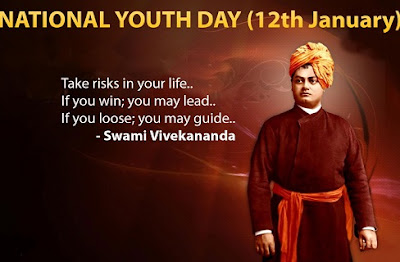NATIONAL YOUTH FESTIVAL 2016
The National Youth Festival in India
is an annual gathering of youth with
various activities including competitive ones. Celebrated to commemorate the birth anniversary of youth icon Swami
Vivekananda, it is organized by Ministry of Youth Affairs and Sports,
Government of India in collaboration with one of the State Governments. Thus it
is held in a different state each year during National Youth Week, 12 to 16 January every year.
This year the
Theme of the Festival: ‘Youth for Digital India’.
The Mascot of the festival: ‘Lado’.
It has been decided to project the
various widely acclaimed initiatives of Ministry of Skill Development and
Entrepreneurship, NSDA, NSDC, DGET & MoMSME etc. through
Skill Development Exhibition, Lectures & Workshops for the benefit of
thousands of participants of the Festival and local youth.
National Skill Development
Agency (NSDA)
NSDA will focus on two verticals of
Quality Assurance and policy research in the skills space. It will operationalise a
credible Quality Assurance framework embedded in the National Skill
Qualification Framework (NSQF) to align skilling outcomes to NSQF across the
skills landscape. To improve synergy between Mission Directorate and NSDA, it
is proposed that Secretary MSDE should also be designated as ex-officio
Chairman of NSDA.
This will enable Secretary to Chair
National Skills Qualification Committee(NSQC) also in his capacity as Chairman
NSDA and will help energize NSQC which is not only responsible for establishing
a Quality Assurance framework embedded in NSQF in the skill space but also
needs to provide a framework for certification, Accreditation of training
providers etc. This aspect is being taken up separately.
Other functions of NSDA include:
- Operationalise
and implement National Skills Qualification Framework (NSQF).
- To
establish and operationalise a QA framework embedded in NSQF to improve
consistency of outcomes in the skills landscape, which will include laying
down a framework for training, assessment and certification processes and
agencies in the country.
- To
operationalise National Skills Qualification Committee (NSQC) to meet its
objectives
- Design
and implement the National Labour Market Information System
- Develop
national protocols for registration and accreditation of private training
providers.
- Promote
use of ‘Skill India’ logo on skill certificates by SSCs/Agencies adhering
to the QA framework.
- Anchor
Prime Minister’s Skill Development Fellow Programme.
National Skill Development
Corporation (NSDC):
National Skill Development
Corporation (NSDC) will support the Mission through capacity building
initiatives and support private training partners. The functions of NSDC are as
follows:
- Catalyse
the creation of market-based, scalable business by providing funding
through a combination of debt, equity and grants
- Implementing
skills voucher programme
- Driving
engagement with industry and businesses
- PromotecentresofexcellencefortrainingoftrainersincoordinationwithStatesandSSCs
- Initiating
and incubating Sector Skills Councils (SSCs)
Directorate General of
Training (DGET):
The two verticals of Training and
Apprenticeship under DGET, MoLE have been shifted to Ministry of Skill
Development and Entrepreneurship from 16th April 2015. These two verticals will
function through Directorate of Training and Directorate of Apprenticeship
Training respectively under the Directorate General of Training under the
Ministry of Skill Development and Entrepreneurship.
It will be responsible for
maintaining existing skill training structures in the country through National
Council for Vocational Training (NCVT). Its large institutional framework
consisting of ITIs, ATIs, RVTIs and other national institutes will act as tools
of execution for Mission activities.
Other functions will include:
- Setting
up framework for structure of courses, assessment, curricula creation,
affiliation and accreditation of institutes, under NCVT
- Develop
national standards on syllabi, equipment, scale of space, duration of
courses and methods of training
- Advise
on training policy in its network of training institutes
- Coordinate
functioning of Industrial Training Institutes (ITIs)
- Run
instructor training programmes for training of trainers
- Run
special institutes for training of women
- Provide
technical support to vocational education across the country
- Anchor
and operationalise Apprentices Act, 1961
- Operationalise
various training schemes through ITIs and Vocational Training Providers
(VTPs)
Conclusion:
The Festival will also witness a
Defence exhibition where various aspects and initiatives of the defence forces,
display of equipment and avenues for recruitment into Armed Forces will be
projected for the benefits of thousands of young participant. A
performance by renowned artist on the life and ideology of Swami Vivekanand on
the opening ceremony will be the highlight of the festival. India
being one of the youngest nations in the world with about 65% of its population
under the age of 35, has a great amount of demographic dividend’
Demographic dividend:
- Demographic
dividend, as
defined by the United Nations Population Fund (UNFPA) means, “the economic
growth potential that can result from shifts in a population’s age
structure, mainly when the share of the working-age population (15 to 64)
is larger than the non-working-age share of the population (14 and
younger, and 65 and older).”
- In
other words, it is “a boost in economic productivity that occurs when
there are growing numbers of people in the workforce relative to the
number of dependents.”
- UNFPA
stated that, “A country with both increasing numbers of young people and
declining fertility has the potential to reap a demographic dividend.






